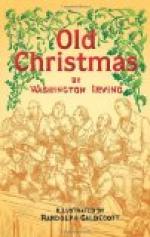As the morning, though frosty, was remarkably fine and clear, the most of the family walked to the church, which was a very old building of gray stone, and stood near a village, about half a mile from the park gate. Adjoining it was a low snug parsonage, which seemed coeval with the church. The front of it was perfectly matted with a yew-tree that had been trained against its walls, through the dense foliage of which apertures had been formed to admit light into the small antique lattices. As we passed this sheltered nest, the parson issued forth and preceded us.
I had expected to see a sleek, well-conditioned pastor, such as is often found in a snug living in the vicinity of a rich patron’s table; but I was disappointed. The parson was a little, meagre, black-looking man, with a grizzled wig that was too wide, and stood off from each ear; so that his head seemed to have shrunk away within it, like a dried filbert in its shell. He wore a rusty coat, with great skirts, and pockets that would have held the church Bible and prayer-book; and his small legs seemed still smaller, from being planted in large shoes decorated with enormous buckles.
I was informed by Frank Bracebridge that the parson had been a chum of his father’s at Oxford, and had received this living shortly after the latter had come to his estate. He was a complete black-letter hunter, and would scarcely read a work printed in the Roman character. The editions of Caxton and Wynkin de Worde were his delight; and he was indefatigable in his researches after such old English writers as have fallen into oblivion from their worthlessness. In deference, perhaps, to the notions of Mr. Bracebridge, he had made diligent investigations into the festive rites and holiday customs of former times; and had been as zealous in the inquiry as if he had been a boon companion; but it was merely with that plodding spirit with which men of adust temperament follow up any track of study, merely because it is denominated learning; indifferent to its intrinsic nature, whether it be the illustration of the wisdom, or of the ribaldry and obscenity of antiquity. He had pored over these old volumes so intensely, that they seemed to have been reflected into his countenance indeed; which, if the face be an index of the mind, might be compared to a title-page of black-letter.
On reaching the church porch, we found the parson rebuking the gray-headed sexton for having used mistletoe among the greens with which the church was decorated. It was, he observed, an unholy plant, profaned by having been used by the Druids in their mystic ceremonies; and though it might be innocently employed in the festive ornamenting of halls and kitchens, yet it had been deemed by the Fathers of the Church as unhallowed, and totally unfit for sacred purposes. So tenacious was he on this point, that the poor sexton was obliged to strip down a great part of the humble trophies of his taste, before the parson would consent to enter upon the service of the day.




